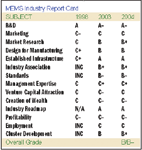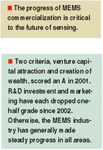How do you select a product or service supplier? When you're looking to establish a long-term affiliation that's critical to your products and customer relationships, you need to do some homework. This is true in all areas, but perhaps especially so where MEMS technology is concerned. After more than 20 years, the infrastructure for this technology—so critical to the future of sensing—is still being established.
 Roger H. Grace |
Having completed the most recent update to the MEMS Commercialization Report Card (which I created in 1998 to assess progress of the industry as a whole and have updated each year since), I'd like to offer the grading criteria as a checklist for partner selection. Whether you seek a supplier of devices, a software design house, an equipment supplier, or a foundry (a company that will produce a finished part from a design), many of the report card subjects are indicators of the proposed partner's ability to deliver an acceptable solution and assist your own success.
Here are a few:
R&D Expenditure. Many technology companies, and most MEMS companies, have cut R&D and staffing investments in recent years. Find out about the activities of your proposed partners in this arena. Your partner must continuously support an aggressive R&D effort to ensure that your processes and products are afforded the best technologies and improvements over time.
Industry Association. The involvement of your partner in industry associations (especially on boards of directors) is a measure of its commitment to the development of the industry. The most significant MEMS industry groups are the Micro and Nanotechnology Commercialization Education Foundation (MANCEF), MEMS Industry Group, SEMI, and Nexus.
 MEMS Industry Report Card |
Profitability. Profitability has been elusive for most MEMS developers. And because many MEMS companies are privately held or are part of much larger organizations, it is difficult to access detailed financial information. Still, it is necessary to determine that your partner will have the resources to deliver on the project for the duration of the program. If financial information is not readily available from your prospective partner, ask for it.
Management Expertise. Some technology companies are led by engineers who lack formal business training. This fact doesn't mean your projects won't be properly costed and managed, but you must take responsibility to assess management's viability and credibility.
 |
See the report card at left (condensed because of space constraints), and get a more complete accounting of all the intervening years plus background and details at www.rgrace.com/Papers/Reportcard.html. Meantime, caveat emptor!